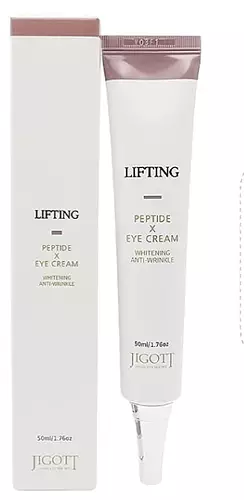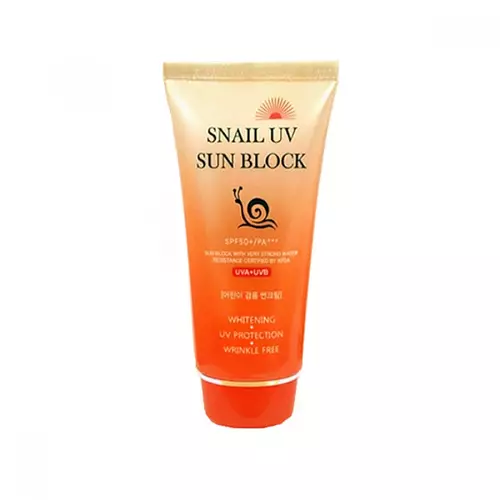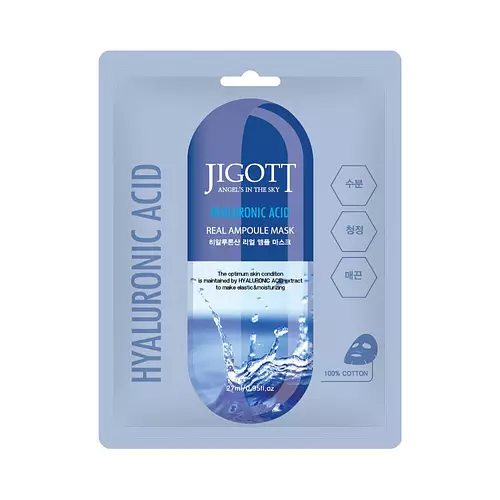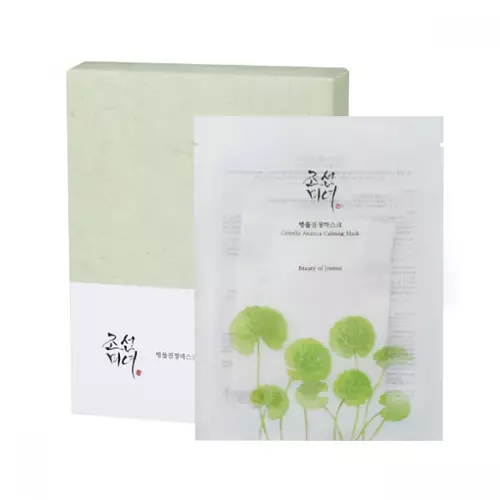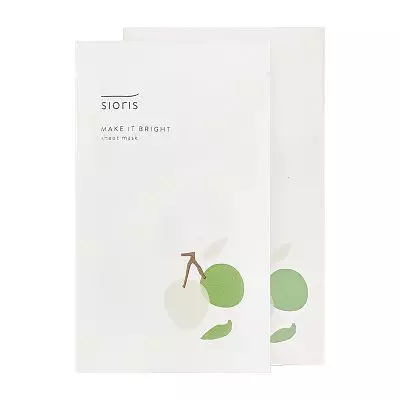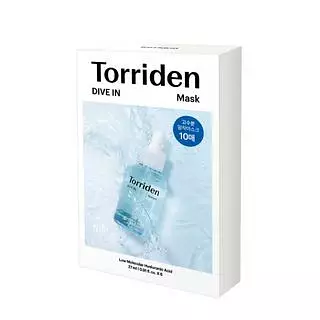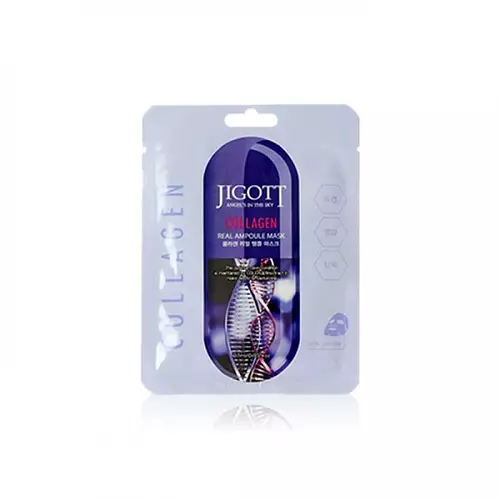
Jigott Collagen Real Ampoule Mask Ingredients Explained
Published on September 19, 2023 Submitted by screamadelica
Overview
What it is
Sheet mask with 19 ingredients that contains hyaluronic acid
Cool Features
It is reef safe
Suited For
It has ingredients that are good for anti aging, dry skin, brightening skin and sensitive skin
Free From
It doesn't contain any harsh alcohols, common allergens, oils, parabens, silicones or sulfates
Fun facts
Jigott is from South Korea.
We independently verify ingredients and our claims are backed by peer-reviewed research. Does this product need an update? Let us know.
Ingredient List (19)
Water, Glycerin, Carbomer, Triethanolamine, Disodium EDTA, Hydroxyethylcellulose, Betaine, Sodium Hyaluronate, Polysorbate 20, Nelumbo Nucifera Leaf Extract, Cucumis Sativus Extract, Pearl Extract, Collagen Extract, Solanum Tuberosum Pulp Extract, Punica Granatum Fruit Extract, Panax Ginseng Callus Culture Extract, Illicium Verum Fruit Extract, Phenoxyethanol, Parfum
You should know
Notable Ingredients
This product contains 1 ingredient that may have this attribute:
Benefits
This product contains 1 ingredient that may have this attribute:
This product contains 1 ingredient that may have this attribute:
This product contains 1 ingredient that may have this attribute:
This product contains 1 ingredient that may have this attribute:
Concerns
This product contains 1 ingredient that may have this attribute:
This product contains 1 ingredient that may have this attribute:
Ingredient Info
Alcohol Free
This product is free of harsh alcohols 🎉
Silicon Free
This product is free of silicons 🎉
Contains Fragrance
Ingredients in this product that are forms of fragrance:
Sulfate Free
This product is free of sulfates 🎉
Paraben Free
This product is free of parabens 🎉
Oil Free
This product is free of oils 🎉
Not Malassezia Safe
Ingredients in this product that are not malassezia safe:
Reef Safe
This product is free of ingredients that damage reefs 🎉
EU Allergen Free
This product is free of EU allergens 🎉
Non Vegan
This product is not vegan 😥
Not Cruelty Free
This product is not cruelty-free 😥
Ingredients Overview
Ingredients Explained
Water. It's the most common cosmetic ingredient of all. You'll usually see it at the top of ingredient lists, meaning that it makes up the largest part of the product.
So why is it so popular? Water most often acts as a solvent - this means that it helps dissolve other ingredients into the formulation.
You'll also recognize water as that liquid we all need to stay alive. Talk about multi-purpose! If you see this, drink a glass of water. Stay hydrated!
Learn more about WaterGlycerin is already naturally found in your skin. It helps moisturize and protect your skin.
A study from 2016 found glycerin to be more effective as a humectant than AHAs and hyaluronic acid.
As a humectant, it helps the skin stay hydrated by pulling moisture to your skin. The low molecular weight of glycerin allows it to pull moisture into the deeper layers of your skin.
Hydrated skin improves your skin barrier; Your skin barrier helps protect against irritants and bacteria.
Glycerin has also been found to have antimicrobial and antiviral properties. Due to these properties, glycerin is often used in wound and burn treatments.
In cosmetics, glycerin is usually derived from plants such as soybean or palm. However, it can also be sourced from animals, such as tallow or animal fat.
This ingredient is organic, colorless, odorless, and non-toxic.
Glycerin is the name for this ingredient in American English. British English uses Glycerol/Glycerine.
Learn more about GlycerinCarbomer is a polymer of acrylic acid. Its main role is to create gel consistency within products.
Carbomer is commonly found in many types of cosmetics products. It is found to be safe in concentrations up to 15%. However, a high amount of carbomer can cause pilling or balling up of products. Most products contain 1% of less of carbomer.
Triethanolamine is an emulsifier and pH adjuster. It is created using ethylene oxide and ammonia. This gives Triethanolamine a nitrogen core and a similar scent to ammonia.
As an emulsifier, it prevents ingredients from separating and enhances texture by adding volume to a product.
PH adjusters are common in cosmetic products. The pH of a product can affect the effectiveness of other ingredients. A product with a high pH may also irritate the skin.
Learn more about TriethanolamineDisodium EDTA plays a role in making products more stable by aiding other preservatives.
It is a chelating agent, meaning it neutralizes metal ions that may be found in a product.
Disodium EDTA is a salt of edetic acid and is found to be safe in cosmetic ingredients.
Learn more about Disodium EDTAHydroxyethylcellulose is used to improve the texture of products. It is created from a chemical reaction involving ethylene oxide and alkali-cellulose. Cellulose is a sugar found in plant cell walls and help give plants structure.
Hydroxyethylcellulose helps stabilize products by preventing ingredients from separating. It can also help thicken the texture of a product.
This ingredient can also be found in pill medicines to help our bodies digest other ingredients.
Learn more about HydroxyethylcelluloseBetaine is a common humectant (a substance that promotes retention of moisture). It's known to be gentle on the skin and can help balance hydration.
Betaine is best for improving hydration and soothing irritated skin. Studies show betaine may help with uneven skin tones.
Betaine is naturally created in the skin and body. The form found within cosmetic products can be either plant-dervied or synthetic.
Learn more about BetaineSodium Hyaluronate is hyaluronic acid's salt form. It is commonly derived from the sodium salt of hyaluronic acid.
Like hyaluronic acid, it is great at holding water and acts as a humectant. This makes it a great skin hydrating ingredient.
Sodium Hyaluronate is naturally occurring in our bodies and is mostly found in eye fluid and joints.
These are some other common types of Hyaluronic Acid:
Learn more about Sodium HyaluronatePolysorbate 20 is made by combining ethoxylation of sorbitan, ethylene oxide, and lauric acid. It is a mild cleansing agent, surfactant, and emulsifier.
As a surfactant, it helps collect dirt and oils for washing. Emulsifiers prevent oils and water from separating.
Polysorbate 20 also adds scent to a product. Since it is made using sorbitol, it has a sweet scent. Sorbitol can also be found in fruits such as apples and peaches.
The lauric acid used to create Polysorbate 20 is often derived from coconuts.
Polysorbate 20 may not be fungal acne safe.
Learn more about Polysorbate 20We don't have a description for Nelumbo Nucifera Leaf Extract.
Cucumis Sativus Extract comes from the cucumber.
Cucumbers are mostly made up of water (95%), and the other 5% is composed of: vitamin C, caffeic acid, fatty acids, amino acids, and other minerals.
Cucumbers have anti-aging, anti-inflammatory, and hydrating properties.
Learn more about Cucumis Sativus ExtractPearl Extract comes from, well, pearls. Pearls are harvested from oysters.
Pearls are rich in amino-acids, magnesium, potassium, calcium, and antioxidant compounds.
Two antioxidants found in pearls include: superoxide dismutase (SOD) and glutathione. Antioxidants aid in reducing the signs of aging.
Studies show pearls can aid in wound healing.
Pearls are harvested from oysters. To be vegan, an ingredient cannot be from an animal source.
Learn more about Pearl ExtractCollagen is the most abundant type of structural protein found in your body. In your skin, it is responsible for keeping it firm and youthful.
Collagen is comprised mostly of glycine, proline, and hydroxypoline. These are amino acids.
Collagen can be used in the morning or night. It will not increase sun sensitivity, but you should always wear sunscreen during the day.
Learn more about Collagen ExtractWe don't have a description for Solanum Tuberosum Pulp Extract.
We don't have a description for Punica Granatum Fruit Extract.
This ingredient comes from the callus cells of ginseng.
Ginseng is rich in antioxidants, favonoids, and vitamins B12 and D.
Learn more about the benefits of ginseng.
Learn more about Panax Ginseng Callus Culture ExtractIllicium Verum Fruit Extract is a fragrance.
Phenoxyethanol is a preservative that has germicide, antimicrobial, and aromatic properties. Studies show that phenoxyethanol can prevent germ and microbial growth. By itself, it has a scent that is similar to that of a rose.
It's often used in formulations along with Caprylyl Glycol to preserve the shelf life of products.
Parfum is a catch-all term for an ingredient or more that is used to give aroma to products. Parfum, or fragrance, can be a blend of hundreds of chemicals or plant oils. This means every product with "fragrance" or "Parfum" in the ingredients list is a different mixture.
In the US, the alternative name for parfum is 'fragrance'. The term 'fragrance' is not regulated in many countries. In many cases, it is up to the brand to define this term.
For instance, many brands choose to label themselves as "fragrance-free" because they are not using synthetic fragrances. However, their products may still contain ingredients such as essential oils that are considered a fragrance. One example is Calendula flower extract. Essential oil ingredients still impart a scent or 'fragrance'.
Depending on the blend, it can cause allergies and sensitivities on the skin. Some ingredients that are known EU allergens include linalool and citronellol.
Products use parfum often to give products a scent or cover up smells of different ingredients.
The bottom line is: not all fragrances/parfum/ingredients are created equally. If you are worried about fragrances, we recommend taking a closer look at an ingredient. And of course, we always recommend speaking with a professional.
Learn more about ParfumBeautiful widgets for your website
Here's what our community thinks of the 19 ingredients in this product ✨
We're dedicated to providing you with the most up-to-date and science-backed ingredient info out there.
The data we've presented on this page has been verified by a member of the SkinSort Team.
Read more about us